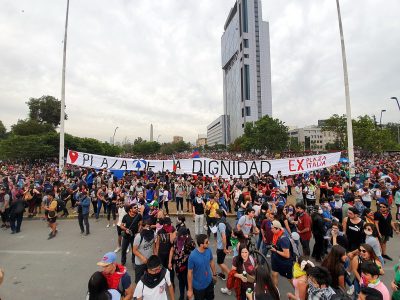If we had to learn and reproduce long numbers or alphanumeric chains each time we wanted to access a website, the Internet wouldn't be what we've all come to know. Undoubtedly, having to write 173.194.42.19 to access Google or 72.21.214.128 for Amazon, for instance, would discourage most users and would be a threat to the logic of open access that characterizes the net.
In order to work as it does, the Internet needs those names — “Google,” “Amazon,” “Yahoo” — that direct us to where we want to go just by typing those words on our keyboard. Computers (or mobiles devices) take care of the rest.
This process is managed by the Domain Name System (DNS). The DNS associates site names (google.com, for instance) with those long and complex numeric addresses and allows users to connect a domain name to an IP address — that which marks the location of the website we want to access to — in a unique way.
In addition, domain names can be conceived as forms of expression and opinion. It thus can be deduced that the institutional design of the administrators of generic top level domain names – gTLD — (that is, the “.com”) and contry code top level domain names – ccTLDs- (the “.ar”, “.br” o “.cl”, for example) are key subjects for analysis.
The Initiative for Freedom of Expression on Internet (iLEI, by its Spanish name), a special program of the Center of Studies for Freedom of Expression and Access to Information at the University of Palermo in Argentina, addresses in its new paper the relationship between freedom of expression, domain names, and the various models adopted for their administration.
Who is administrating?
The responsibility of administrating domain names is imperative for the Internet to work as it does and for sites to be easily found by users.
A high number of pages need some kind of control or coordination. This task is carried out by the Internet Corporation for Assigned Names and Numbers (ICANN). Among other tasks, ICANN is in charge of defining policies about how the system should work and coordinating globally the DNS architecture.
But ICANN is not in charge of administrating and assigning every gTLD and ccTLD. For gTLDs, ICANN delegates this function to some businesses and, for ccTLDs, of particular interest to the project's researchers, to administrative entities in each country.
Therefore, as mentioned by iLEI in their research, domain names can be thought of as a form of expression. Negative interference by states, when assigning or renewing them, can affect users and owners who exercise this fundamental right.
Models of administrating ccTLDs
Various ccTLD administrators around the world share different functions, responsibilities and attributes. These can include basic registration functions, services to members, services to registered users and registering entities, and domain representation on related forums.
ccTLD administrators have adopted different models that, when examined with regard to the right to freedom of expression, have virtues and flaws.
On one hand, we have the so-called “Administrator Model” with strong interference by the state. For these cases, ccTLD administration is under the government's control — no other sector participates.
One example of this model is in Venezuela, where “.ve” is administrated by the National Telecommunications Commission[es] (CONATEL, by its Spanish name), under the authority of the Ministry of People's Power for Telecommunications and Informatics. China might be another example for this kind of model where, although with some variations, the Chinese Academy of Science, under the authority of the Ministry of Informatics Industry of China, controls the CNNIC, which administrates “.CN”.
This model has a disadvantage, though. If we think of a domain name itself as expression, an opinion of public interest or political critique, the higher the degree of government control, the more suspicion might be generated about potential denials of registration or renewals of domains that could be related to government critiques.
Another model might be known as the “Multiple Interested Parties” model. In this case, there is participation of public entities, but also from the civil society. Such is the case in Brazil, where the civil non-profit NIC.br implements the decisions of CGI.br (Internet Steering Committee), a mixed entity made up of government representantives, private sector actors, civil society, and experts. Another case is Canada, where registry administration is the responsibility of the Canadian Internet Registration Authority (CIRA), whose authorities are chose by the users themselves.
Administration according to international standards
As noted by iLEI in the paper, ideally, states would have administrators for registration and renewal of domains, independent of any kind of government intereference. Thus, multi-sector participant models could be useful.
Furthermore, in states with government administrators, a design free of government interference should be guaranteed. To achieve this, it's important to provide administrators with fiscal stability and to guarantee them that removals will require special processes that prevent arbitrary decision-making.
For every case, if we consider that the expressive value of the domain name itself is a form of expression and opinion, registration and renewal administrators should bear in mind international standards that guarantee the exercise of the rights to opinion and expression.
Domain name administrators should adhere to recommendations in the Annual Report of the Office of the Special Rapporteur for Freedom of Expression (IACHR), which states that expression of political content deserves the highest level of protection. A denial to register a domain name should be viewed suspiciously an analyzed with an eye toward the website's content, as it may constitute prior censorship, which is specifically banned by IACHR.
Administrators also must adhere to General Comment number 34 on Article 19 of the International Covenant on Civil and Political Rights (ICCPR). The article establishes that the right to not be threatened due to one's opinions must be protected.
The adaptation of the procedures to these standards, carried out by local domain administrators, will guarantee users the capacity to exercise their rights on line.





4 comments